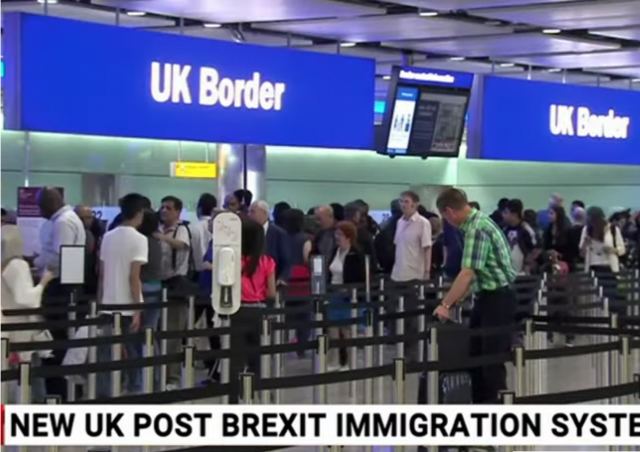UK: New policy restricts entry of non-English speaking and unskilled foreign workers

The British government has announced an overhaul of immigration policy, restricting the entry of non-English speakers and unskilled foreign workers. The new immigration rules, based on the Australian-style points system, is part of a post-Brexit overhaul.
“UK borders will be closed to non-skilled workers – and all migrants will have to speak English,” the left-wing Guardian newspaper lamented, summing up the new policy.
The new rules, expected to come into effect on January 1, 2021, aim to put an end to the import of cheap labor from abroad. The immigration reform will help create a “wage, high skill, high productivity economy” in the United Kingdom, a government statement said.
The immigration rules are also meant to end the “free movement” of people as dictated under the EU regulations.
“For too long, distorted by European free movement rights, the immigration system has been failing to meet the needs of the British people. Our approach will change all of this,” the statement added.
The BBC reported the UK government’s post-Brexit immigration plan:
Low-skilled workers would not get visas under post-Brexit immigration plans unveiled by the government.It is urging employers to “move away” from relying on “cheap labour” from Europe and invest in retaining staff and developing automation technology.The Home Office said EU and non-EU citizens coming to the UK would be treated equally after UK-EU free movement ends on 31 December.Labour said a “hostile environment” would make it hard to attract workers.But Home Secretary Priti Patel told BBC Breakfast the government wanted to “encourage people with the right talent” and “reduce the levels of people coming to the UK with low skills”. (…)The government wants to bring in a “points-based” immigration system, as promised in the Conservative election manifesto.Under this, overseas citizens would have to reach 70 points to be able to work in the UK.Speaking English and having the offer of a skilled job with an “approved sponsor” would give them 50 points.More points would be awarded for qualifications, the salary on offer and working in a sector with shortages.
The criticism came from left-wing opposition parties and leading business lobby groups. The “new policy drew immediate criticism from employers, particularly over the addition of waiters, waitresses, and “elementary” agriculture and fishery workers to the list of low-skilled workers,” The Guardian reported.
“Jobs the government considers ‘low-skilled’ are vital to wellbeing and business growth,” claimed the head of the UK the Recruitment and Employment Confederation.
According to the pro-EU Liberal Democrats, the proposed changes in the immigration policy were “based on xenophobia.” The Labour Party also played the racism card, with Diane Abbott — Jeremy Corbyn’s close ally — claiming that making English a criterion for immigration amounted to “dog-whistle politics.”
Brexit Party leader Nigel Farage welcomed the announcement, saying that “the days of employing cheap labor are finished.”
He also slammed the big business lobbying for cheap migrant labor.
“These same employers have always wanted cheap labour. They could not care less about the impact of it on the lives of ordinary working men and women and the communities in which they live,” the Brexit Party leader said.
It is worth noting that the Labour Party’s insistence on the EU-style immigration policy alienated the party’s traditional working-class base. In the December 2019 election, Prime Minister Boris Johnson’s Conservatives flipped many long-held Labour seats, giving them their most significant victory since the days of Margaret Thatcher. By tightening immigration rules, Johnson is fulfilling his election promise of “taking back control” of UK borders.
The Sun: ‘Boris Johnson’s tough new post-Brexit immigration system explained.’
[Cover image via YouTube]
CLICK HERE FOR FULL VERSION OF THIS STORY